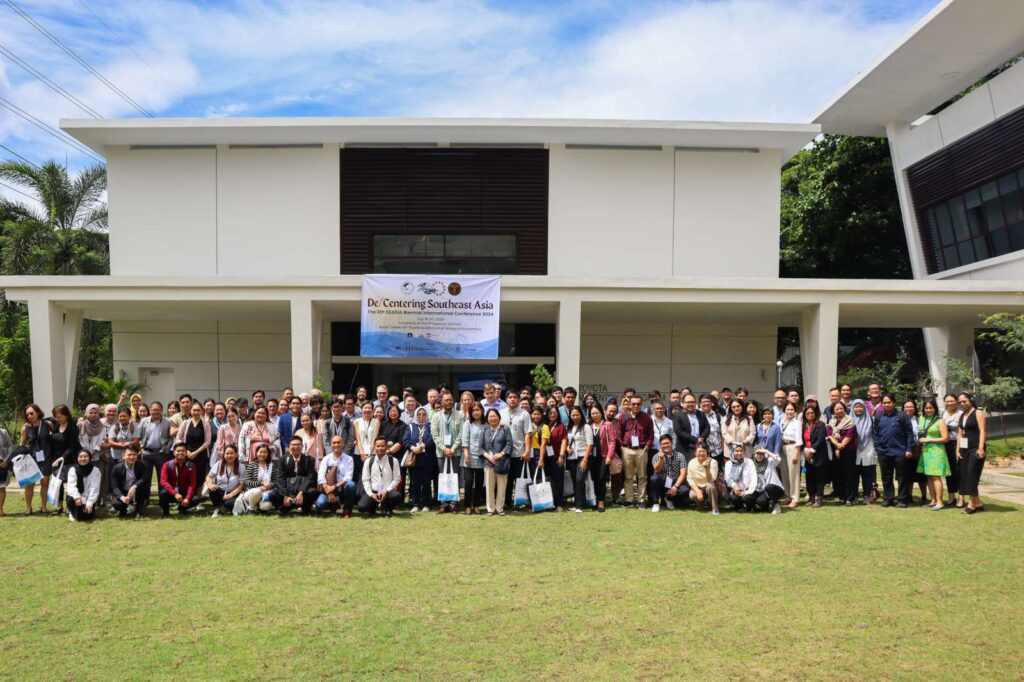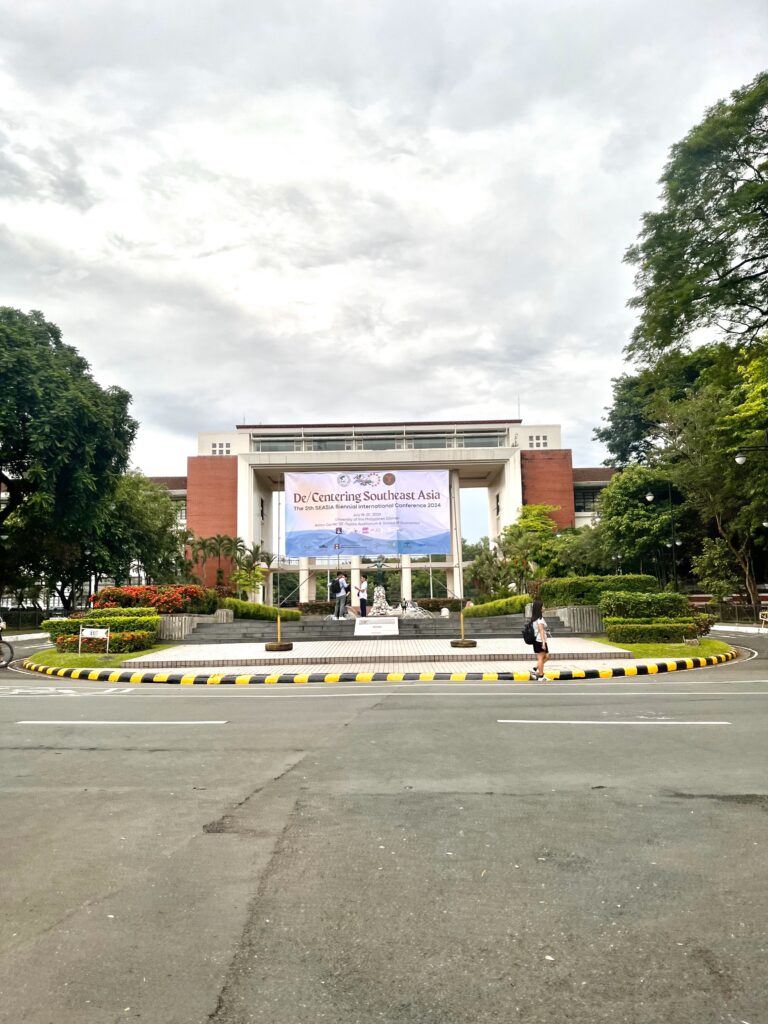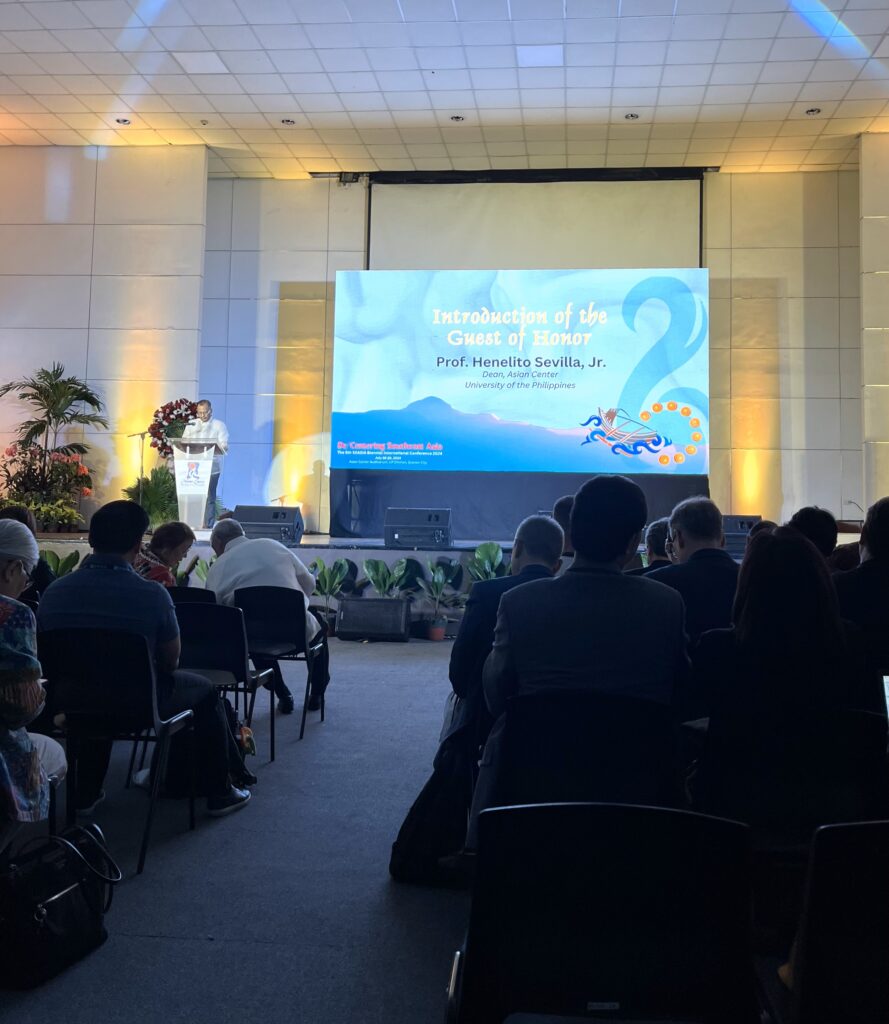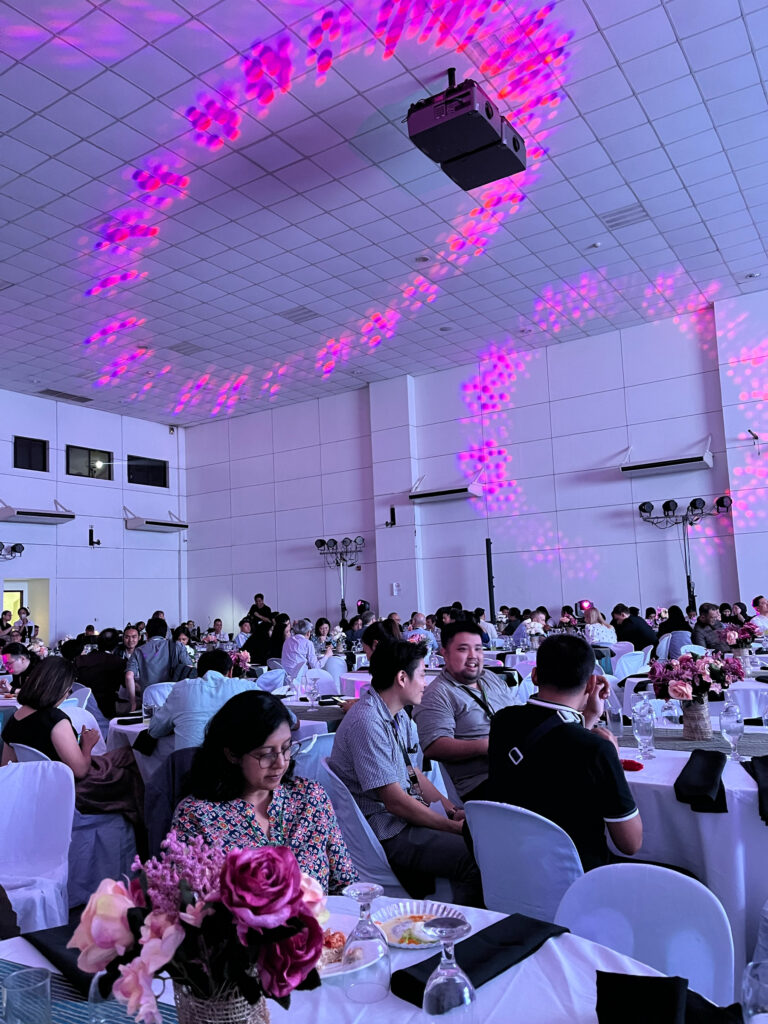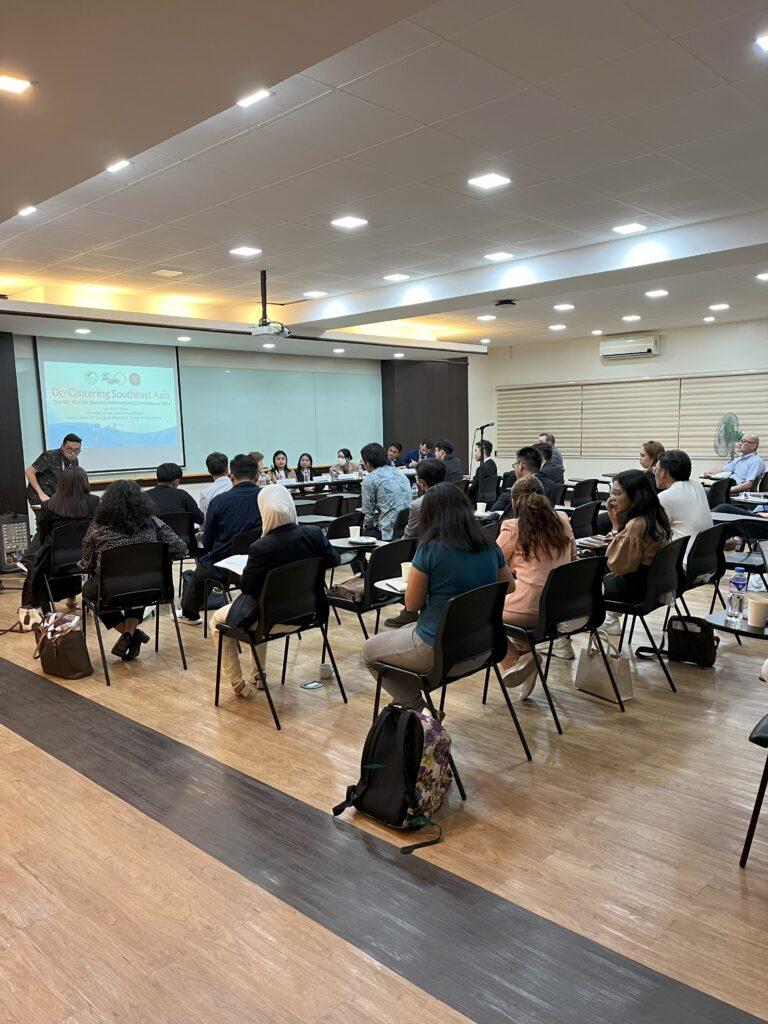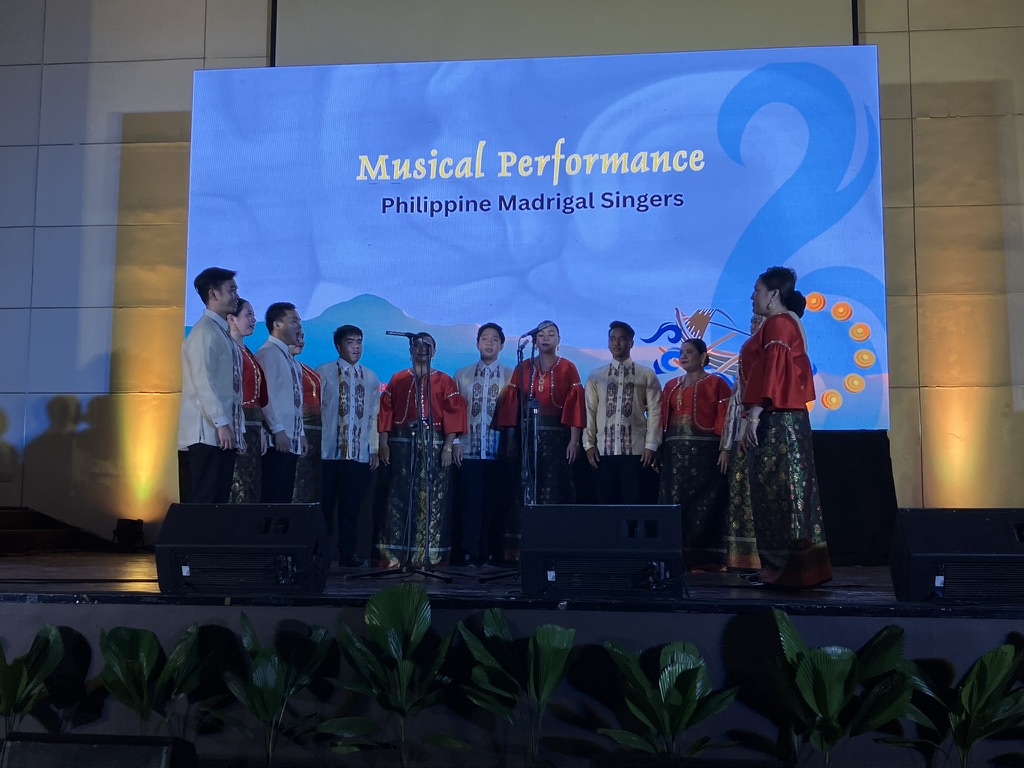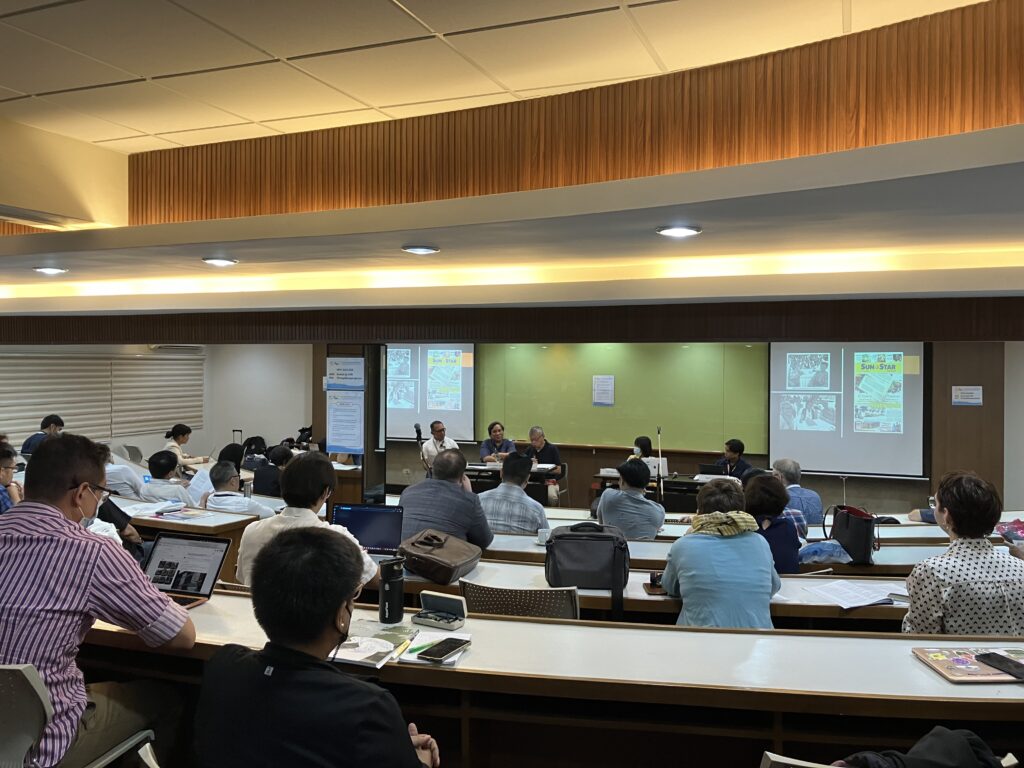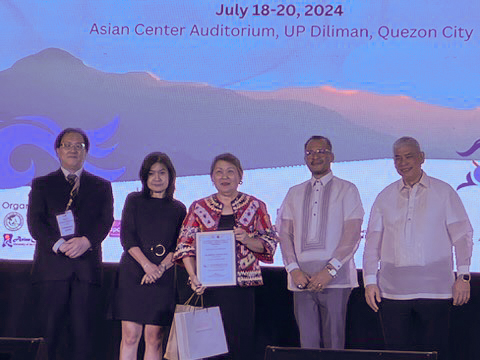The Consortium for Southeast Asian Studies in Asia (SEASIA) held its 5th Biennial Conference at the University of the Philippines from 18 to 20 July 2024. Set up in 2013 by leading area studies and research institutions in Southeast and Northeast Asia, SEASIA aims to promote academic and policy dialogues, regional linkages, and research collaborations to enrich and deepen the understanding of and praxes in and on Southeast Asia.
With the central theme “De/Centering Southeast Asia,” SEASIA 2024 provided a platform for centering knowledge production and praxis on Southeast Asia toward the region to amplify Southeast Asians’ perspectives, identities, and agency. The Conference sought to challenge dominant narratives and perspectives historically centered in the “West” and its gaze on Southeast Asia, and highlight the diverse and complex experiences, histories, and cultures of the region as told, experienced, and analyzed by Southeast Asians themselves. It aimed to shift analytical positions away from dominant centers towards peripheries to enrich and ground theory and practice, and resist subordination.
The Conference was attended by over 400 participants from more than 25 countries across the globe. Those who attended came from a variety of disciplines, from the humanities and the social sciences, and ranged from young scholars to leading lights in their respective fields. The diversity of participants was a testament to the growing interest in Southeast Asia as an area of study, research, and praxis.
Opening Ceremony
The Opening Ceremony began with the multi-awarded Madrigal Singers providing a powerful rendition of the Lupang Hinirang, the Philippine national anthem, followed by the Welcome Message of Atty. Roberto Lara, the Secretary of UP and Board of Regents. In his address, Secretary Lara pointed out that the SEASIA 2024 Conference was more than just an academic gathering. It symbolized “our shared passion and dedication to understanding and advancing the diverse and dynamic region of Southeast Asia” and thus was a “celebration of the rich cultural tapestry, historical depth, and socio-political complexity” of the region. In closing, Secretary Lara invited the participants to embark on this journey with “curiosity, open minds, and a shared commitment to advancing our understanding of this remarkable region.”
For her Opening Remarks, SEASIA Chair, Professor Antoinette Raquiza of the UP Diliman Asian Center, pointed out that SEASIA has “come a long way since its first international conference at Kyoto University in 2015.” She emphasized that the huge interest in the SEASIA conferences attests to “our mission’s continuing relevance” of providing a more accessible platform for scholars of and from Southeast Asia. For this year’s conference theme, Professor Raquiza stressed that it:
… highlights the need for Southeast Asian Studies and Southeast Asians to interrogate dominant narratives and institutions that legitimize and reinforce unequal relations—between the North and South, among and within countries, as well as across generations and genders. It recognizes that we are at the threshold of a historic opportunity to make Southeast Asian states and societies matter. Southeast Asian Studies has a tremendous and weighty role to play in transforming the region and its peoples from objects to subjects of world history.
Finally, the Guest of Honor Professor Emeritus Maria Serena Diokno, former Chair of the National Historical Commission of the Philippines (NHCP) and co-founder of the Southeast Asian Studies Regional Exchange Program (SEASREP), gave a lecture entitled “Southeast Asia Up Close and Personal: The Landscape of Southeast Asian Studies in the Region Today,” in which she shared some of the findings of the Henry Luce Foundation-funded SEAREP survey. Among the highlights: one, there are more than 70 full degree programs across undergraduate and graduate levels in the region; two, the fastest growing subfield in Southeast Asian studies has been ASEAN studies—a trend that gained momentum in 2010 alongside preparations for regional integration; and, three, there have been improvements in Southeast Asian language teaching programs and more journals publishing in and on Southeast Asia.
Professor Diokno, however, also pointed out the uneven development of these regional trends. Countries like Thailand, Malaysia, and Vietnam have established themselves as the leading hubs for Southeast Asian studies while other countries have lagged in developing comparable academic initiatives. This disparity, she said, underscores the need for greater investment and cooperation across the region to ensure a more balanced and inclusive development of the field.
Keynote Lectures
The three-day Conference featured two other keynote lectures by distinguished scholars: Professor Syed Farid Alatas of the National University of Singapore and University Professor Emeritus and Philippine National Artist Ramon Pagayon Santos of UP Diliman.
Professor Alatas, a leading scholar on autonomous social science traditions in Southeast Asia, centered his lecture on what it means to decolonize Southeast Asian scholarship. He clarified that decolonization does not necessarily entail the complete rejection of Western perspectives—as theories and concepts may be generalizable and applied to other contexts. Instead, the problem lies with the Eurocentric framing of Western knowledge as supposedly imbued with universality and thus marginalizing and silencing non-Western intellectual traditions.
To counter such distortions, Professor Alatas advocated for a more inclusive framework and teaching of the social sciences, one that situates non-Western thinkers at the center. One such thinker, he pointed out, was Jose Rizal—a pioneering scholar whose critical views on colonial conditions laid the groundwork for the later development of decolonial thought and autonomous knowledge. He cited Rizal’s famous essay The Indolence of the Filipino (1890) as pivotal source for Syed Hussein Alatas’ pioneering work, The Myth of the Lazy Native (1977). By foregrounding Rizal as a foundational figure in the genealogy of decolonial thought in Southeast Asia, Professor Alatas underscored the region’s intellectual heritage in challenging Eurocentrism and reshaping the global discourse on knowledge production. In concluding, he called on Southeast Asians to continue contributing to the development of autonomous knowledge and traditions.
For his part, Professor Santos’ keynote addressed the impact of Western art and music on Southeast Asian cultures and artistic traditions. He discussed how the imposition of Western artistic norms by European imperialism fundamentally reshaped Southeast Asian expressive traditions, redefining not only its “systemic facets, material properties, repertory and performance practice, but also its conceptual and contextual foundation, aesthetic and pedagogical parameters, as well as the attitudinal and qualitative valuation of its purveyors as the universal … mode of human expression.” This, he continued, has resulted in the devolution and substitution of expressive norms, re-codification of terms, and the introduction of new aesthetic criteria.
Professor Santos stressed that artistic performances and expressions in Southeast Asia have unique experiential and sociocultural values. Among the exmaples he cited was the the kudyapi, a two-stringed, fretted boat-lute, is more than just musical ornamentation, but also served as a medium for storytelling and poetic expression; the kwintangan-kayu, a kind of xylophone made from a set of wooden logs or beams of varying lengths, is played as part of farming rituals aimed at invigorating seedlings and promoting the growth of crops; the badiw, a sung poetry, is traditionally performed by the Ibaloi as part of their rituals for the dead; and, the Thai molam is a traditional art form that integrated poetry, music, and dance. According to Professor Santos, such examples highlight the experiential and integrative nature of Southeast Asian artistic expressions, which often fuse music, narratives, spirituality, and communal values. He thus proposed rediscovering cultural affinities and strengthening shared identities across the region by moving away from Western artistic norms as the default lens.
Conference Panels
SEASIA 2024 received around 500 abstract submissions, consisting of 418 individual presentation proposals from scholars from 190 institutions in around 30 countries. Revolving around the theme of “De/centering Southeast Asia,” panels and presentations constituted a diverse array of subthemes such as decolonization of area studies, historiography, culture, economics, politics, regional diplomacy and sustainable practices—all narrated from the Southeast Asians’ lens.
Among the most prominent topics in these panels, which are closely related to the theme, are decolonizing history, area studies, and science and technology. Conference panel speakers presented alternative viewpoints on studying the narratives on Southeast Asian communities. The panel “Decolonizing Area Studies” discussed the decolonization of Japanese studies in the Philippines, East Timor studies, and Southeast Asian studies in China. Wartime history was also given attention through the lens of narratives from civilians and the marginalized sectors during the Japanese occupation in the Philippines. In the “Decolonizing Science” panel, speakers discussed indigenous knowledge systems and scientific knowledge production in Southeast Asia such as in maritime navigation, medical science, marine biology, and historiography.
Owing to the pressing demands generated by the worsening climate crisis, several scholars also discussed the decentering of sustainability and climate action in Southeast Asia. The “Social Responses to Ecological Crisis” panel had a presentation on the region’s role in sustainable development, particularly in low-carbon transition while another one questioned the sustainability of industrial agriculture, with a discussion on the socioecological crises caused by a plantation in Indonesia. Similar panels such as “Local Crisis Response” and “What is Comfortable and Sustainable Cooling? Exploring the ‘Airconditioning Nexus’ from a Multi-Disciplinary Perspective” discussed disaster management and sustainable urban spaces, respectively.
Still another conference subtheme was foreign relations and strategic studies. A panel on the Association of Southeast Asian Nations (ASEAN) and regional diplomacy touched on the need for a regional framework encouraging inter-member accountability and strong disaster management. Other presentations were on education cooperation, arms trade, Sino-ASEAN relations, and tensions in the Taiwan Strait. A panel on “Examining the ASEAN, Alliances and Maritime In/Security Dynamics” discussed the U.S. Indo-Pacific Strategy and the importance of ASEAN centrality and a Free and Open Indo-Pacific to the region’s stability.
The panels also provided a space to engage scholars with pressing issues on populism and political narratives in the Philippines and its neighbors. The panel “Political Narratives and Power” involved a presentation on populism and wars on drugs between the Philippines and Indonesia. “Appraising Rodrigo Duterte’s Legacy in the Philippines” was a two-part panel discussion, attesting to the extensive academic interest in the former president and its impact on contemporary politics in Southeast Asia.
Decentering scholarship in the region also included discussions on the region’s changing economy and, given the archipelagic nature of the region, the role of maritime trade. “Rethinking and Decentering Trade, Exchange and Engagement in Island Southeast Asia” was a two-part panel featuring research by scholars on maritime trade and spice routes while the “Economic History” panel focused on socioeconomic transformations since the post-independence era in Southeast Asia, particularly on informal labor, rural entrepreneurship, and market creation.
Finally, the interdisciplinary scope of the conference provided representation to Southeast Asian heritage, arts, culture, and media. Traditional textiles from the Philippines’ T’boli people and from Indonesia’s Batak Toba people were highlighted in “Heritage Textiles and Fashion” panel and generated a rich discussion concerning the livelihood, intellectual protection and preservation, and the future of the traditional textile industries. Similar panels on the arts and media include “Performance and Heritage (Re)Creating Southeast Asia,” “Cultural Fluctuations in Southeast Asia: Text, Television, and Technology,” and “Cybersports, Games, and Digital Media.”
Plenary Roundtable Discussion
The last day of the conference had a plenary roundtable discussion titled “De/Centering Southeast Asian Studies and the Search for Relevance.” What is the relationship between the effort to decolonize academic disciplines and the political, cultural, and social advocacies of individual scholars and public intellectuals? What are the greatest challenges that face the project of autonomous knowledge production in Southeast Asia today? Speakers for the roundtable were Professor Syed Farid Alatas, Professor Caroline Hau of Kyoto University, and Dr. Ping Tjin Thum of New Naratif. This event was moderated by Professor Lulu Reyes of the University of Santo Tomas.
Professor Alatas began by underscoring the importance of language as a repository of concepts, and cautioning against readily applying Western frameworks to Southeast Asian contexts. He outlines several key strategies. To decenter the field, Southeast Asian scholars must take the lead in defining its intellectual priorities, focusing on local exigencies rather than mirroring academic trends in the Global North. Furthermore, there is a need, he argued, for original research agendas addressing country and region-specific issues. It is also of utmost importance to decolonize the research process by moving away from extractivist methods and practices. Finally, Professor Alatas warned of internal threats, including those posed by “nativists” (who recognize the pitfalls of Eurocentrism yet brings xenophobia to the fore), “impostors” (whose works appear to be decolonizing but ultimately promotes Eurocentrism), and “silencers” (who claim to be comrades but engage in studies that suppress local voices and perspectives). He closed his talk with a simple yet strong point: to decolonize knowledge, and to create autonomous knowledge, is to create relevant knowledge.
Professor Hau called for a multifaceted approach to decentering Southeast Asian studies. She proposed decentering knowledge and critically interrogating metropole-periphery relationships across multiple scales—local, national, regional, transnational, and global—and reimagining local and regional sites as active co-creators of autonomous knowledge. She emphasized the importance of advancing collaboration through publishing in non-metropolitan journals, writing in non-English languages to access various intellectual traditions, fostering South-South academic exchanges, and making academic work accessible to local and regional communities. Professor Hau highlighted the need for academic sanctuaries to ensure free and independent inquiry, and urged scholars to reconsider their audience and the purpose of their work, ensuring that it aligns with the needs of local communities.
Dr. Thum extended the discussion by arguing that true decolonization entails liberation from neoliberal capitalism, illiberal democracy, and nation-state nationalism—systems and ideologies that have historically sustained oppression. He invited scholars to interrogate frameworks and ideologies not based on their geographic origin, whether local or foreign, but on their impact: do they perpetuate exploitation and discrimination? And do they uphold human dignity and human rights? According to Dr. Thum, this is the primary objective of decolonization. He further highlighted the importance of transcending the ideological confines of the nation-state, which often traps scholars. In his closing remarks, he urged attendees to join the campaign against the ongoing “scholasticide” in Gaza, where academic institutions are being targeted.
During the Q&A session, the panelists addressed several critical topics. Professor Alatas discussed integrating contrasting intellectual traditions and advocated pluralism in our methodologies. Dr. Thum emphasized empowering marginalized groups to ensure broader representation in research and policy, while Professor Hau. underscored the need to connect academic theory with practical community and national engagement. The discussion concluded on a lighthearted yet reflective note, with the panelists emphasizing the role of humor in decolonization efforts. They noted that humor can challenge dominant ideologies and foster greater intellectual engagement in unique ways.
Special Events
Also part of the diverse set of conference activities was the launch of two books: “Games, Changes, and Fears,” edited by Aries Arugay and Jean Encinas-Franco, and “The Geopolitics of Green Colonialism: Global Justice and Ecosocial Transitions,” edited by Miriam Lang, Mary Ann Manahan, and Breno Bringel. A book exhibit also featured publications and materials from ISEAS Publishing, UP Press, UP Center for Integrative and Development Studies, UP Center for Ethnomusicology, and Vibal Group, Inc.
The conference film festival featured five documentaries from the Visual Documentary Project (VDP) at Kyoto University’s Center for Southeast Asian Studies (CSEAS), as well as a film by Dr. Ma. Crisanta Flores of the Department of Filipino and Philippine Literature (UP Diliman). The films tackled issues such as inequality, overseas work, and personal experiences, connecting the conference participants to the social realities of the region through film.
To end the three-day conference, a gala concert was organized by the UP Diliman College of Music, led by Dean Patricia Brillantes Silvestre, to serenade the participants with Philippine traditional music and cultural performances. The performers were the Maguindanao Kulintangan Ensemble of the Padayon Rondalla and UP Tugtugang Musika Asyatika (TUGMA). Also featured was an excerpt of “Putri Anak: Isang Bagong Komedya,” written by Professor LaVerne de la Peña and conducted by Mary Katherine Trangco. The performance featured special participation of Alex Dagalea, Eliza 伊丽莎, and Jude Matthew Servilla.
Organizers
Held in the Philippines for the first time, SEASIA 2024 was organized by the UP Host Committee, with Governing Board Member, Professor Antoinette R. Raquiza (Asian Center) as Chair, , Dr. Ramon G. Guillermo (Center for International Studies) and Dr. Aries A. Arugay (Political Science Dept., College of Social Sciences and Philosophy) as Co-Chairs, Ms. Monica F.A.W. Santos (Anthropology Dept., CSSP) as Secretariat Head, and Dr. Sol Doreteo Iglesias (Political Science Dept., CSSP) Dr. Patricia Brillantes-Silvestre (UPD College of Music), and Dr. Ma. Crisanta Nelmida Flores (Departamento ng Filipino at Panitikan ng Pilipinas, UPD College of Arts and Letters), with Asian Center Dean, Dr. Henelito A. Sevilla, Jr. as Ex-Officio Member.
The conference was also made possible through the generous partnership and collaboration with several institutions at the UP Diliman: Center for International Studies (CIS), Department of Political Science, Philippine Center for Economic Development (PCED) of the School of Economics, Office for Initiatives in Culture and the Arts (OICA), Center for Ethnomusicology, College of Arts and Letters Foundation (CALF), and the Social Sciences and Philosophy Research Foundation, Inc. (SSPRFI). The Political Economy Program of the UP System Center for Integrative and Development Studies (CIDS) provided secretariat support.
SEASIA 2024 received generous funding support from various UP offices: the Office of the Chancellor (OC), Office for Initiatives in Culture and the Arts (OICA) and Office of the Vice Chancellor for Research and Development (OVCRD) from UP Diliman; and. the Office of the President, Office of International Linkages (OIL), and Center for Integrative and Development Studies (CIDS) from the UP System. The conference external partners were the Center for Southeast Asian Studies (CSEAS) at Kyoto University, Japan, Toyota Motors Corporation and TMC Foundation, and VIBAL Group, Inc.
Conclusion
The core theme of SEASIA 2024 was conceived from a pressing need to assert Southeast Asian perspectives and narratives on regional and global knowledge. The conference provided an opportunity for Southeast Asian scholars and practitioners, representing different epistemic and social communities, to share their research, advocacies, and experiences as well as to engage in sustained dialogue and form collaborative work with Southeast Asianists and other scholars and researchers from other regions. The world has emerged from the uncertainties brought by the COVID-19 pandemic to confront other sources of insecurities, such as rising geopolitical rivalries, climate change, and economic downturns, that put communities in the margin at risk. Thus, the wide turnout of academics and thought experts in the SEASIA 2024 highlights the importance of the call to raise Southeast Asian representation and voices from the periphery.
The Biennial International Conference is hosted by SEASIA member institutions as the main platform for the consortium’s mission to promote Southeast Asian studies in the region and beyond. Now chaired by Dr. Hsin-Huang Michael Hsiao, Ph.D., the consortium is set to conduct the SEASIA 2027 at Nanyang Technological University (NTU).
